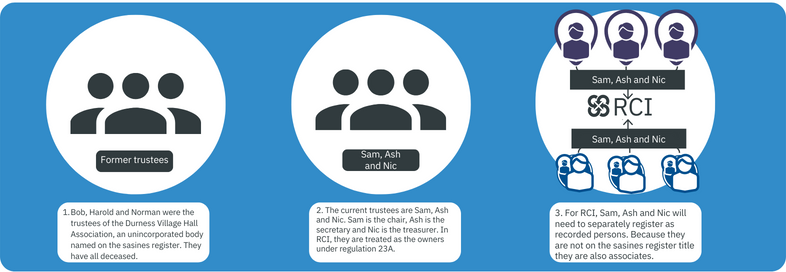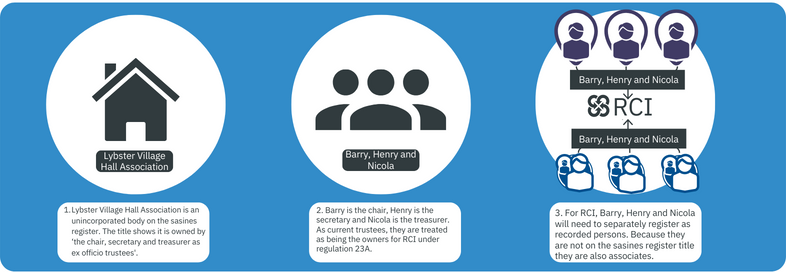What is an unincorporated body?
An ‘unincorporated body’ is an organisation set up through an agreement between a group of people who come together for a reason other than to make a profit. Unincorporated bodies or associations do not have legal personality and therefore cannot own land in their own right. Therefore, the ownership of assets lies with individuals acting on its behalf, usually office bearers or management committees. Individual members are personally responsible for any debts and contractual obligations. The trustees will be shown on the land register as the legal owners of the land or as the tenants of a registrable lease. It may not be noted that they are doing so on behalf of the unincorporated body.
An unincorporated body is typically a small body that may be a charity or another voluntary or community group. Common examples include village hall associations, sports clubs, voluntary groups and faith and belief groups.
Regarding charities, a charitable body will be subject to charity law and regulated by the Scottish Charity Regulator (OSCR). There are various forms of charity. A charitable incorporated organisation (CIO) and a Scottish charitable incorporated organisation (SCIO) are out of scope of RCI. They therefore cannot be a recorded person, but other forms of charity are not. More guidance can be found in the about recorded persons article.
In many cases, it is possible that the arrangement itself may not be known by the persons involved in it.
For example, some associations have previously understood themselves to be the legal owners of the land. In other cases, the original trustees may have historically been appointed ex officio, for example, based on their position as the local bank manager or parish priest. The current officeholders may not be aware of their position as property trustee, or the position itself may have been abolished.
What information does RCI need?
It will need to be established who the owners or tenants under a lease of more than 20 years of the property are and whether there are any associates. An unincorporated body itself cannot be the owner or tenant of the land. Therefore, it will normally be trustees for the unincorporated body who will be the owners or tenants and will be shown on the land register or Register of Sasines.
It may or may not be the trustees who are responsible for the general control and management of the land. In some situations, the trustees may be the owners or tenants, but a separate group or committee may have general control and management powers.
Registration in RCI is necessary when the owners or tenants own on behalf of the unincorporated body, and there is another person(s), not being an owner or tenant, who is responsible for the general control and management of the administration of the unincorporated body. In such circumstances, the owner or tenant is the recorded person, and the other person with responsibility for general control and management is the associate.
Examples of those excepted from the requirement are:
- a paid professional such as a solicitor or accountant
- a creditor such as the holder of a Standard Security
- a member of the judiciary presiding over proceedings to remove a member of the body from any trust established to hold property on the body’s behalf
It is necessary to consider who has the official responsibility to make a decision, such as the sale, lease or change of use of land, regardless of the influence which may be exerted by the membership of a body. These people would normally be, but are not restricted to, the owner or tenant (of a 20+ year lease), OR those in a trustee / office bearer position. Membership of an unincorporated body will not of itself make a person an associate – they must have responsibility for the general control and management of the administration of the body.
The membership, committee or congregation are all members of the unincorporated body but will not all be associates simply because of being a member. We would normally expect office bearers to be the associates, however it may be the case that in certain circumstances a body may believe that other persons (for example members of the committee) are also responsible for the general control and management of the administration of the body. It is up to each individual body to consider their own circumstances when considering submission to RCI.
Office bearers , for example the chair, treasurer, or secretary, are normally responsible for the general control and management of the unincorporated body.
If the trustee or office bearer of the unincorporated body is the owner or tenant, known in RCI as a recorded person, information is needed including:
- their name
- the name of the unincorporated body
- a contact address
- how they own the land are they owner or tenant and do they own the land in a certain capacity, for example, as a trustee or office bearer
If the trustee or office bearer of the unincorporated body is a person with controlling interest, known in RCI as an associate, information is needed on:
- their name
- the name of the unincorporated body
- a contact address
- their date of birth, this is for internal purposes only and will not be shown on the register
- the date the association between the unincorporated body as recorded person and the associate started
- information on whether they are subject to a transparency regime
- if the associate has been previously added to the register the associate reference number (ARN)
If you fall within the list of transparency regimes you are out of scope from being a recorded person and will not have to register in RCI. This is the case irrespective of the capacity you act in. This means if, for example, a UK company is the owner or tenant the fact that they hold the property as trustee on behalf of an unincorporated body will not bring them in the scope of the RCI.
Trustees of unincorporated bodies – updating the land register title
If the land registered title does not show the current trustees of the unincorporated body as the owner or tenant of land, it is recommended the trustees update the land register title.
Updating the land register title will mean that an entry to the RCI will not be required, provided there is no other person who has responsibility for the general control and management of the administration of the body. This is because the land registered title will have been updated to show the current trustees and be transparent.
The appropriate course of action for updating the land register title will depend on whether trustees are being:
- removed because of death or resignation
- added because of their ex officio role on appointment to that office (office bearers) or
- added because they have been assumed as new trustees
Updating the land register will involve rectification or registration.
Rectification
Rectification of the land register title will be possible in the following situations:
- To remove trustees who have died or resigned
- To add new trustees who are ex officio, following their appointment to that office, for example office bearers
To make and submit a request for rectification of the land register title to update the land register title, the process and guidance set out in inaccuracy and rectification should be followed.
Rectification is not possible for land that is held in the Sasine Registers.
Registration
Registration of a deed, most likely a notice of title, in the land register will be required to add new trustees, excepting ex officio trustees.
Where some trustees resign, and new trustees are assumed, a combination of rectification to remove outgoing trustees from the title and registration for the new trustees would be required.
Existing owners or tenants are no longer associated with land
There will be cases where the land is held by trustees or on behalf of an unincorporated body and where the land register or Register of Sasines lists as owners or tenants only persons who no longer have any legal connection with the property. The most likely example of this situation is where the trustees have resigned or are deceased, and therefore although they still appear on the land register or Register of Sasines they have no connection with the unincorporated body.
Regulation 23A of RCI provides that current trustees or those holding on behalf of an unincorporated body are to be treated as owners or tenants. In such circumstances, the said current trustees will be the recorded persons and for the purposes of making an entry in RCI they are also the associates. This covers the following situations where:
- land owned/tenanted by trustees or members of an unincorporated body and all of the trustees/office bearers named, ex officio or otherwise, have ceased to be trustees
- land owned/tenanted by ex officio trustees but only the office is named, where the office bearers names do not appear
In these circumstances the current trustees or office bearers would require to register in RCI and be registered as both a recorded person and associate. They must answer "no" to the question "Are any of the current trustees named on the land register or sasine register title" and add the recorded person as an associate.
This means the current trustees or office bearers will be entered twice in their submission, first as a recorded person and secondly as an associate. They should add the recorded person as an associate first and then add any other associates.
We recognise that in exceptional circumstances, a recorded person will not be an associate because they are not responsible for the general control or management of the administration of the unincorporated body, even though Regulation 23A applies. The RCI service supports the creation of such entries.
The date of association will be the date the current trustee or office bearer became trustee or office bearer, of the land, for the unincorporated body.
The recorded person does not need to notify the other associates that are also both recorded persons and associates of the submission to the RCI.
Example of recorded persons and associates within unincorporated bodies
Example 1
The following is an example of multiple recorded persons within an unincorporated body that have multiple associates.
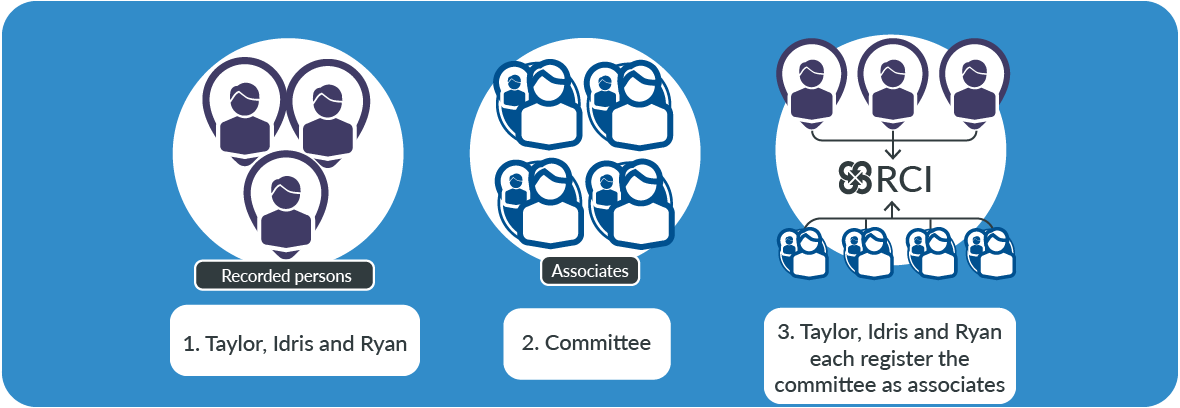
- Taylor, Idris and Ryan are trustees of the Village Hall Association (an unincorporated body). They are named on the land register.
- There is also a committee of office bearers that are responsible for the general control and management of the association. The office bearers are not named on the land register. For RCI these 4 office bearers would be associates.
- Taylor, Idris and Ryan would be the recorded persons and would each need to register in RCI and name the 4 office bearers as their associates.
- Note, because unincorporated bodies or associations cannot own land in their own right it is the trustees who are the owners. Therefore in RCI the recorded person will not be the Village Hall Association. Rather, the recorded persons are Taylor, Idris and Ryan, the current trustees.
Example 2
The following example illustrates an unincorporated body where the office holders named on the title are no longer present.
- Bob, Harold and Norman are the trustees of the Durness Village Hall Association, an unincorporated body named on the sasines register. They were trustees when the village hall was built in 1930. They have all deceased and there are now different trustees.
- The current trustees of the Durness Village Hall Association are Sam, Ash and Nic. Sam is the chair, Ash is the secretary and Nic is the treasurer. In RCI, they are treated as the owners under regulation 23A.
- Because unincorporated bodies or associations cannot own land in their own right it is the trustees or office bearers who are the owners. Therefore in RCI the recorded person will not be Durness Village Hall Association. Rather, the recorded persons are the current trustees or office bearers.
- For RCI, Sam, Ash and Nic will need to separately register as recorded persons. Because they are not on the sasines register title they are also associates. Sam, Ash and Nic will each need to register one another as an associate.
- When Sam registers as recorded person he will add himself and Ash and Nic as associates. When Ash registers as recorded person he will add himself and Sam and Nic as associates. When Nic registers as recorded person she will add herself and Sam and Ash as associates.
Example 3
The following example illustrates an unincorporated body that names the office on the title only, not individual names. The current office holders who are not named on the title are treated as the owners and will require to be the recorded persons and also the associates.
- Lybster Village Hall Association is an unincorporated body. Its title is on the sasines register as the village hall was built in 1930. The names of the individuals who were trustees at this time aren’t on the register. Instead, the title shows that the village hall is owned by ‘the chair, secretary and treasurer as ex officio trustees of the Village Hall Association’.
- Barry is the chair, Henry is the secretary and Nicola is the treasurer of the Lybster Village Hall Association. As current trustees, they are treated as being the owners for RCI under regulation 23A.
- Because unincorporated bodies or associations cannot own land in their own right it is the trustees or office bearers who are the owners. Therefore in RCI the recorded person will not be Lybster Village Hall Association. Rather, the recorded persons are the current trustees or office bearers.
- For RCI, Barry, Henry and Nicola will need to separately register as recorded persons. Because they are not on the sasines register title they will also each need to register one another as an associate.
- When Barry registers as recorded person he will add himself, Henry and Nicola as associates. When Henry registers as recorded person he will add himself Barry and Nicola as associates. When Nicola registers as recorded person she will add herself, Barry and Henry as associates.
Example 4
The following example illustrates an unincorporated body which has changed its charity status to become a Scottish Charitable Incorporated Organisation (SCIO).
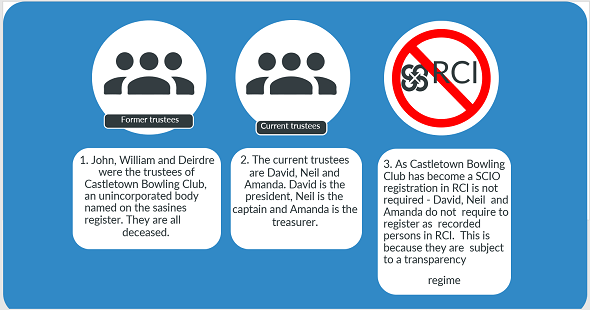
Charitable incorporated organisations (CIOs) and Scottish Charitable Incorporated Organisations (SCIOs) are not subject to the Regulations. CIOs are active in England and Wales – SCIOs are their Scottish equivalent. As their information is already publicly available, the RCI Regulations do not require SCIOs or CIOs to report in RCI.
- Castletown Bowling Club own Castletown Bowling Green and Pavilion. Their title has been unchanged on the sasine register since 1950. Their title names John, William and Deirdre as the office bearers and owners of Castletown Bowling Green and Pavilion on behalf of Castletown Bowling Club. John, William and Deirdre are now deceased.
- David, Neil and Amanda are the current president, captain and secretary respectively of Castletown Bowling Club, an unincorporated body, they are not named on the title.
- The bowling club has been a registered charity for several years but it has recently changed its charitable status to become a Scottish Charitable Incorporated Organisation (SCIO).
- The RCI Regulations do not require SCIOs (or CIOs the equivalent in England and Wales) to register in RCI. Therefore David, Neil and Amanda, the office bearers of the bowling club, do not require to register in RCI.
- Had Castletown Bowling Club not changed its charitable status to become a SCIO then David, Neil and Amanda would be required to register in RCI (see example 2).
Example 5
The following example illustrates an unincorporated body where only some of the office holders named on the title are present.
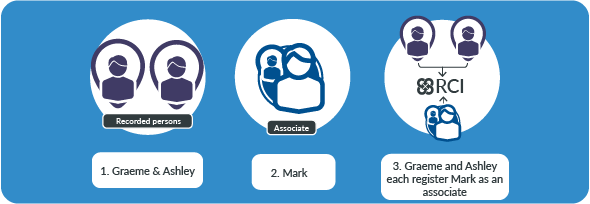
- Mark, Graeme and Ashley currently hold the positions of captain, secretary and treasurer of Reay Bowling Club, an unincorporated body. The bowling club title is on the Land Register.
- The Land Register title was completed in 2010 and lists three office bearers as trustees, being Graeme (secretary), Ashley (treasurer) and Lachlan who was captain in 2010.
- Because unincorporated bodies or associations cannot own land in their own right it is the trustees or office bearers who are the owners. Therefore in RCI the recorded person will not be the bowling club. Rather, the recorded persons are the trustees or office bearers.
- In order to register in RCI, Graeme and Ashley will need to separately register as recorded persons. They will each need to register Mark as an associate because he is not on the Land Register title.
- When Graeme registers as recorded person he will name Mark as an associate. When Ashley registers as recorded person he will also name Mark as an associate.
More information
Further information on the regulations relating to unincorporated bodies can be found in Part 4 of Schedule 1 and regulation 23A.
Additional information on RCI regulations
The Scottish Property Professional Support Lawyers Group (SPPSLG) has prepared an article on the RCI regulations 2021 working with Registers of Scotland.
Find out more about the SPPSLG article
| Previous | Next |

